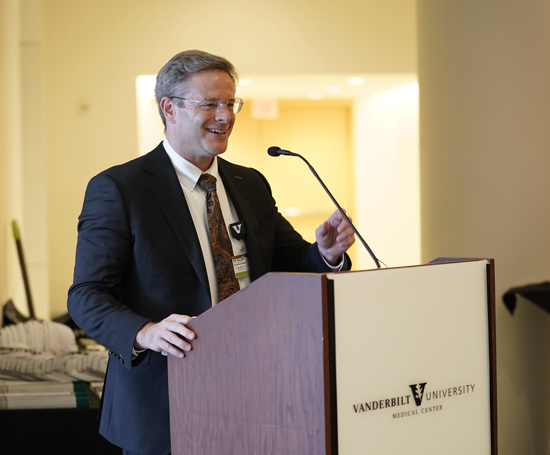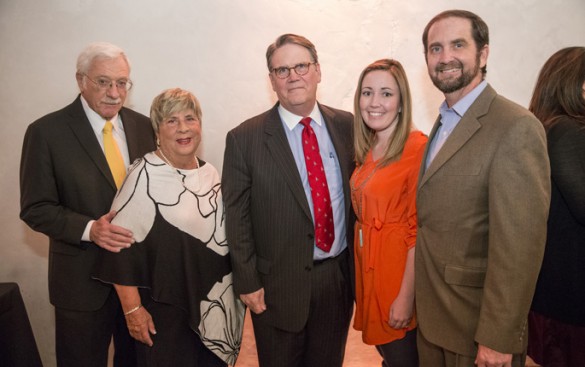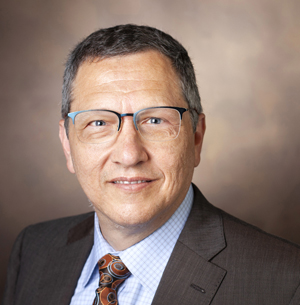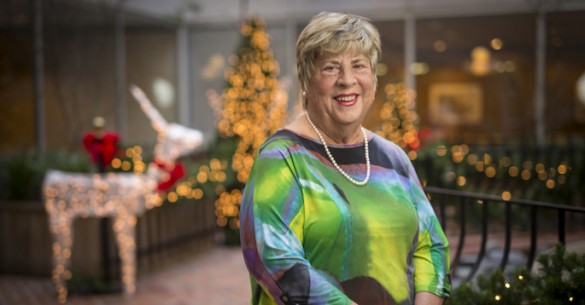
Twenty-five years ago, Julie Damon’s family was preparing to say their goodbyes.
Comatose and on life support at Vanderbilt University Medical Center (VUMC) with liver failure, the options for the 45-year-old wife and mother of two were slipping away.
Then the hospital received a call that a donor liver was available.
“The bottom line was that this transplant was a miracle in every aspect,” said Damon, now 70. “I mean, the stars really did align for this.
“Here I was on death’s door. My husband was told I probably had about 24 hours before life support would be withdrawn and the one doctor who needed to be present (C. Wright Pinson, MBA, M.D.,) was on his way out of town.”
Damon smiles now, imagining the frenzied, emotional discussions filling the hallways of the intensive care unit that housed Vanderbilt’s liver transplant program.
As former chair of the liver transplant program and long-time surgical director of the Vanderbilt Transplant Center, Pinson vividly remembers the scenario.
“The first liver transplant was an exciting and important milestone,” said Pinson, now deputy vice chancellor for Health Affairs and CEO of the Vanderbilt Health System. “We had prepared for months, practicing with the team and preparing with the laboratory and blood bank. The first case was an urgent situation that pressured us into action.”
“It has been very gratifying to see Julie’s experience and that of her husband’s vicariously through the lives of their children and grandchildren,” Pinson said. “It was a great example of the very best of transplantation.”
Kelly Wright Jr., M.D., surgical director of the adult liver transplant program, assisted Pinson with the groundbreaking transplant.
“I was on call that day,” recalled Wright. “We knew we had to exercise the appropriate level of caution. We wanted what was best for our patient and if that meant sending her to another center (we would)… but I knew that if we could get Dr. Pinson back to the hospital we would have our full team in place.
“We decided we were ready. It was a full house in the OR that day. Her outcome has been phenomenal.”
According to Wright, Vanderbilt’s liver transplant program is one of the largest in the Southeast, with 1,722 transplantations (total at the end of 2015) performed since the start of the program in 1991. There were 130 transplantations in 2015. Wright expects the Transplant Center to perform more than 120 liver transplantations annually with survival outcomes better than the national average and shorter waitlist times.
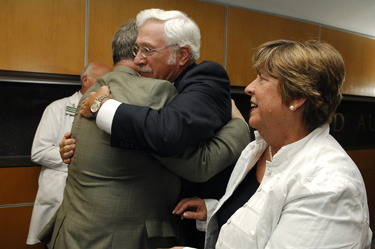
“We have spent 25 years developing a program, continually refining and improving it,” Wright said. “We consistently achieve excellence in patient outcomes, improvement in patient quality of life, cost reduction, educational efforts and research.”
Damon said that all of those factors played a role in her long-term survival.
“In the beginning we were happy to make it a week, a month, a year and even five years. But when I reached the 10-year mark, I was really scared,” said Damon of her continued healthy status. “When you have a transplant, you are so very thankful for every single day, but you know there may be a time when you are feeling a bit more tired or run down, that it could be the start of something.
“Sometimes there just aren’t words for how grateful you are. I feel like I won the lottery. I never buy a ticket and I don’t sign up for anything when there is a prize because I already won the best prize — life.”
Months after Damon became the first adult liver transplant patient at Vanderbilt, a 14-year-old boy from Tupelo, Mississippi, also made his mark in the VUMC history books.
Brian Aldridge, now 38, knows that being a pediatric trailblazer at Vanderbilt allowed him to experience many firsts. Transplant doesn’t limit a person, it allows them endless opportunities, he said.
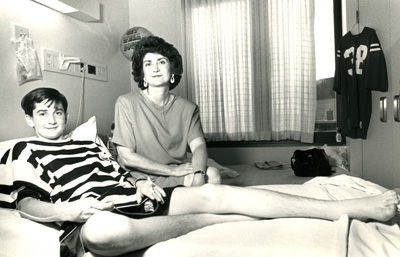
Aldridge recalls the night he came home from baseball practice not feeling well. After a few days of missed school, his mother took him to the doctor. They were sent home with instructions to drink plenty of fluids in an effort to flush out the virus that was ailing him.
Things took a completely different turn on the morning of May 3.
“I told my mother that I just didn’t feel right, and she said I was going back to the doctor. I asked her why and she told me to go look in the mirror — the whites of my eyes were yellow.”
Further testing revealed that Aldridge had a rare form of hepatitis that required a liver transplant for survival. As his conditioned rapidly declined, he transferred to Vanderbilt for a transplant evaluation.
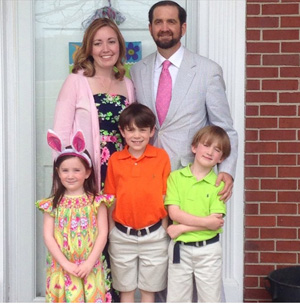
Days after being admitted, the teen lapsed into a coma. Doctors were working against the clock to find a suitable liver.
“After a few days in the coma, my mother was told that if I did not have a transplant within the next 24-36 hours, they did not expect me to live.
“My mother called our church and they formed a prayer chain in Tupelo,” said Aldridge. “About 12 hours after that prayer chain started, Dr. Pinson got a call that a liver was available for me.
“And you won’t believe where from!” chuckled Aldridge. “The Elvis Presley Trauma Center. How ironic was that? Here I was, a kid from the birthplace of Elvis Presley, and my liver was coming from a center named after him.”
On May 21, 1991, Aldridge became the recipient of the first pediatric liver transplant at Vanderbilt.
“My liver is doing great,” said Aldridge. “I really don’t think much about my transplant now. It’s just who I am. I have had this liver longer than the one I was born with. There is so much I have been able to do because of my transplant.”
Aldridge went on to graduate from high school and subsequently began a camp for disabled children and adults. The organization was formed in honor of his only sister, who was born with Down syndrome. At 26 years old, he was elected to the Mississippi State Legislature.
Married 10 years to Jenna Leigh, the couple has three children — Jackson, 9, Eli, 7, and Embry, 5.
Although Aldridge experienced a few bouts of rejection, he has been healthy overall.
“I was so paranoid after my transplant,” said Aldridge. “I remember Jerita Payne (who then served as the liver transplant coordinator) telling me, ‘Brian, if you are feeling good, more than likely everything is OK.’ I was probably 15 or 16 at the time. I still use that common sense directive today.
“Whatever I am going through, whatever the challenge before me, I look back to my liver transplant days,” he said. “It really taught me to persevere through whatever arises.
“I’m so thankful for Vanderbilt and all it does for its patients.”
Those are nice words to hear, said Douglas Hanto, M.D., Ph.D., chief of the Pediatric Liver Transplant Program, professor of Surgery and director of the Vanderbilt Transplant Center.
Hanto is working with the departments of Pediatrics and Surgery to develop a comprehensive pediatric liver disease and transplant center at Monroe Carell Jr. Children’s Hospital.
“Our goal is to build a liver center that would include medical, surgical and transplant components to care for children with congenital and metabolic liver conditions that are uncommon. Not only is there a need for such a program, but the expertise and support are already here to move forward with plans,” Hanto said.
As Vanderbilt’s liver transplant program celebrates its 25th anniversary, Hanto expects his team to perform 10-15 pediatric liver transplants a year and begin serving as the Southeastern regional referral center for children.
Damon, who celebrates her 50th wedding anniversary this June, is looking forward to Feb. 23 — her transplant anniversary.
“It’s a very special day,” she said. “It’s more important than Christmas and birthdays for me. I am a medical miracle and I live each day to the fullest.”













